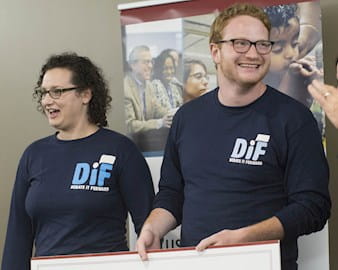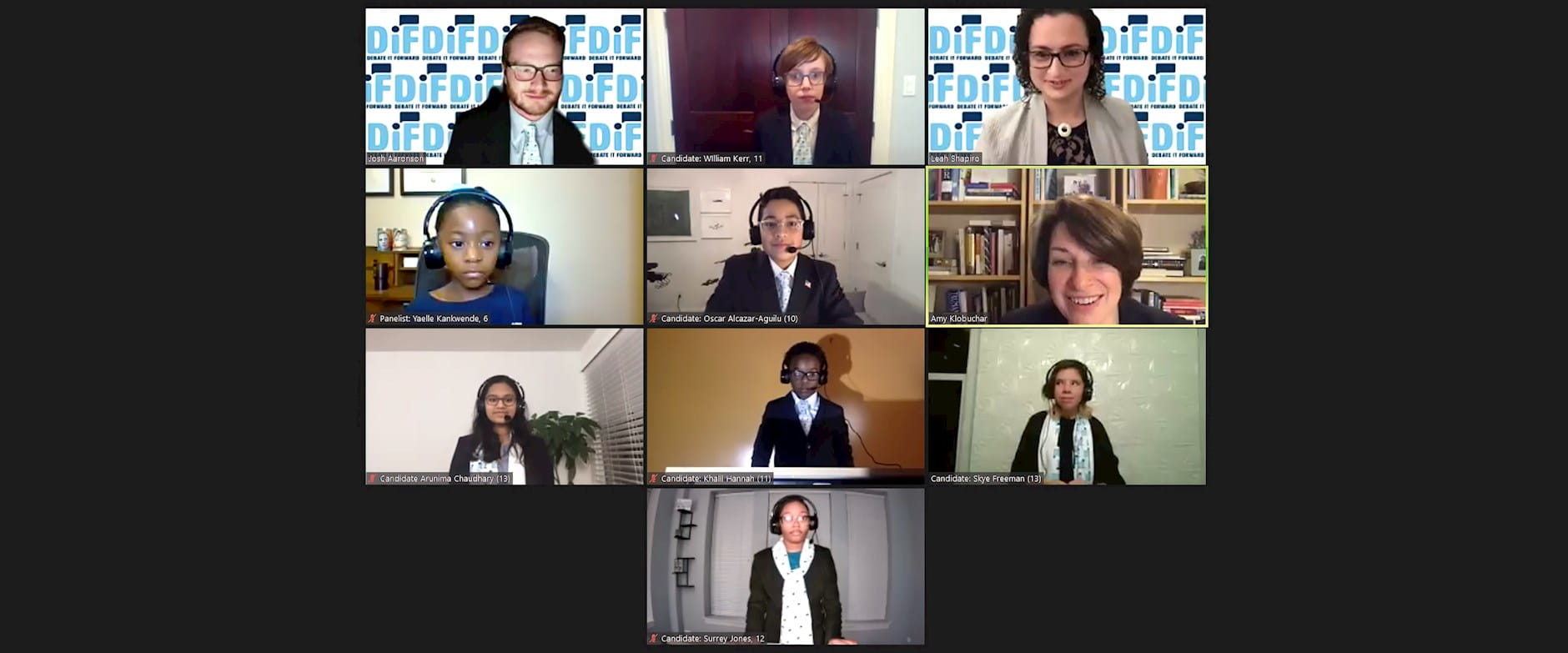
Before Jessica attended an after-school debate program, the Chicago third grader only felt confident whispering to a select few adults, including her teacher.
Two years into debate, she surprised her teacher with a smile and three simple words: “I talk now.”
“We want to make public speaking similar to addition,” said Josh Aaronson, AB ’19, cofounder and COO of Debate it Forward. “It’s a new concept in first grade, but by the sixth grade they could do it naturally. It’s critical because students need to be able to advocate for themselves, whether it’s in their personal or professional life. We’re doing everyone a disservice if we don’t give them the ability to confidently and coherently express themselves.”
Designed to help students overlooked by traditional debate programs, especially those ages 6-14 from low-income backgrounds or with developmental disabilities, Debate it Forward (DiF) works to ensure all students have the ability to access their voice and confidently express themselves.
DiF launched in 2016 in Hyde Park with Aaronson and cofounder Leah Shapiro, AB ’18, CEO, and now the founders are expanding their reach after gaining momentum and winning the John Edwardson, ‘72, Social New Venture Challenge (SNVC) in 2019.
Operated by the Rustandy Center for Social Sector Innovation at the University of Chicago Booth School of Business and the Polsky Center for Entrepreneurship and Innovation, the SNVC is the social impact track of the University of Chicago’s nationally ranked business launch program, the New Venture Challenge. Since 2011, the SNVC has jump-started more than 100 nonprofit and for-profit ventures with social missions that have raised more than $35 million.
Aaronson and Shapiro started Debate it Forward as UChicago College students by teaching a mix of after-school programming, classes, and summer camps focused on building skills like idea generation and persuasive speaking. When they reached five Chicago schools—marketing to schools and parents directly—they knew their model worked, but they needed help to grow.
“We had some unique challenges in scaling, and we wanted to participate in the SNVC to have access to the coaching that would prove critical to our eventual expansion and success,” Aaronson said.
Those challenges multiplied in 2020 when the pandemic closed schools and forced everyone online. Debate it Forward was able to quickly and nimbly make all its classes remote, even adding one class for 4 and 5-year-olds and hosting a virtual “presidential debate” for middle schoolers that was moderated by U.S. Sen. Amy Klobuchar. During the past year, the nonprofit has served 700 students—the same as pre-pandemic.
SNVC mentors helped Debate it Forward founders plan a detailed expansion, including creating measures for success and building a staffing model. DiF is now a team of four full-time employees with classes led by 32 teachers (including UChicago student interns). Despite having to move debate classes online last year, the startup hosted summer camps serving 140 students and plans to have 10,000 students and 25 schools participating across Chicago in the next five years.
While expanding, Aaronson and Shapiro also both earned Rustandy Center Tarrson Social Venture Fellowships, which provide advising and $25,000 in funding to graduating students or recent alumni while they raise philanthropic or venture capital for their social enterprise.
DiF board member Adrienne Hiegel is excited to open the program up to more students, who often take part in activities that are so fun—coming up with two reasons why a randomly assigned object would be the best birthday present ever, for example—they don’t realize they’re learning.
“My son, who hates everything, loved Debate it Forward! It’s taught him how to put together a reasonable position and to fight back. Instead of just arguing, he tries to have a legitimate debate,” she said, joking that her son now makes a solid case for eating candy for breakfast.
“He can feel the power of language and have the experience of arguing for something,” said Hiegel. “He can see himself as someone who can harness words. They really feel like grownups and they rise to that level.”
Results like this are what drove Aaronson and Shapiro to create DiF and what inspires them to plan for the future. DiF uses—and trains teachers to use—its own debate curriculum, but the startup is at the beginning stages of licensing that curriculum to be able to reach more students.
“As a nonprofit, it’s easy to get caught up in all the impact and to forget that it’s also a business,” said Aaronson, noting that the SNVC winner has raised $375,000 and counting.
“Developing a sustainable business model is a cornerstone of the SNVC, which teaches students to have impact in the social sector just as in the profit-maximizing sector,” said Will Colegrove, senior associate director of the Rustandy Center’s Edwardson Social Entrepreneurship Program. “The SNVC empowers nonprofits like Debate it Forward to incubate, launch, to grow intentionally, and to drive the greatest possible impact.”


